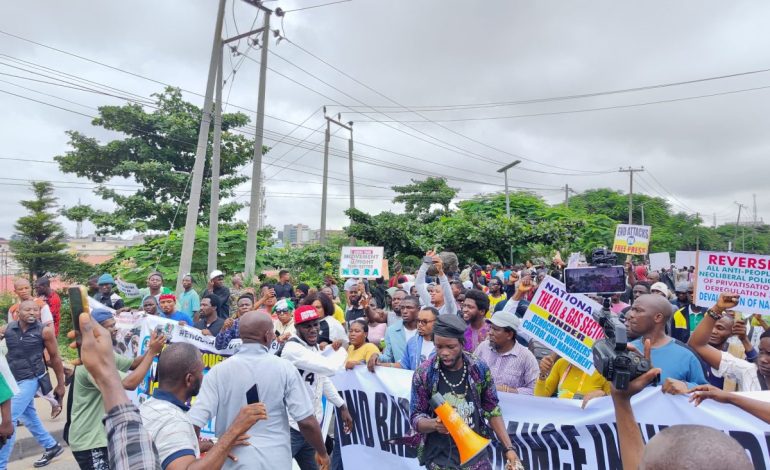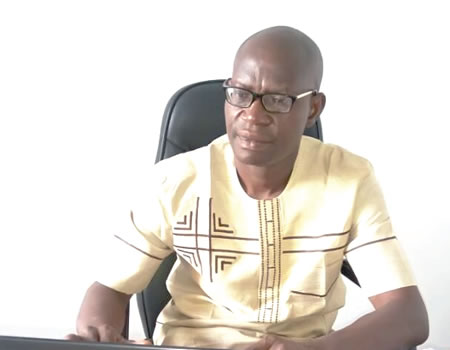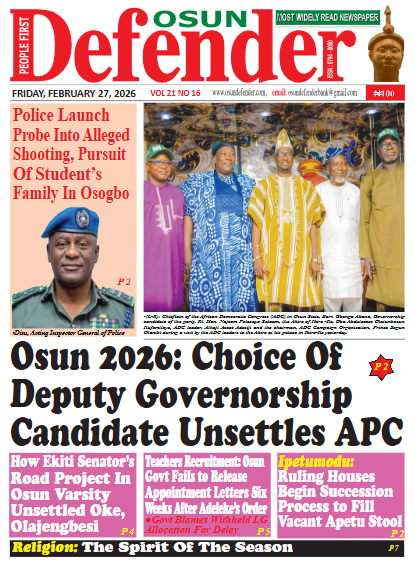OBSERVATION: Nasty Civil Rule Experience

NO young person from 30 years downwards could imagine what Nigerian people experienced in the 80s and 90s, especially patriots in the leadership of the struggle against military dictatorship – for the enthronement of democracy. Some were gruesomely murdered, while many were incarcerated under decree 2. I had a 6-month taste of the military’s dreadful decree rule with Anthony Fasayo in Benin Maximum Prison in 1995 cum 1996.
Very few people, including President Bola Ahmed Tinubu, who were privileged to be alive today could narrate the story of military dictatorship in Nigeria and the fierce struggle the workers, students, artisans, unemployed, Pro-labour Non Governmental Organisations and Spirited individuals waged to terminate military rule for enthronement of Civil Rule.
And what were the grievances against military dictatorship? Its socio-economic programmes were – Structural Adjustment Programme (SAP) – World Bank and IMF programme and devaluation of Naira among others anti-people’s programmes. The military denied us fundamental human rights such as freedom of protest, freedom of speech and assembly; they denied us justice, rights to challenge the ruling elite in any form including dragging them to the courts of the land, to mention but very few; as the military dictators were not accountable to the people since they seized power through the barrel of gun. Under the military rule, there was no State/National Assembly and its Decrees ousted most powers of the Judiciary. There were no checks and balances which allowed unlimited corruption as “power corrupts, absolute power corrupts absolutely.”
Since governance is all about the welfare of the people, Civil Rule, also seen as Democracy, became the beacon of all fighters for good governance with readiness to make sacrifices in various detention camps including paying the supreme price – death! Eventually, a fresh breath of civil rule ensued in 1999 with the expectation of better life for the Nigerians, especially the poor. The Obasanjo/Atiku led People Democratic Party (PDP) Federal Government shattered this hope and aspirations throughout its 8 years, selling our national and collective patrimony to themselves and cronies under the platform of National Council on Privatisation and the Bureau of Public Enterprise headed by Vice President Atiku Abubakar. The regime made rich people to be richer and poor poorer.
In 2007, the regime handed over to President Umaru Yar’Adua of same PDP via an election that was fraught with many electoral malpractices attested to by President Yar’Adua who was the major beneficiary of the electoral fraud. Although he died midway into his first tenure, he was poised to offer better leadership. In fact, reports and recommendations of Justice Uwais Panel that he did set up to look into our electoral process with the view to make recommendations that would stop the madness eventually translated to various innovations like PVC, BVAS, etc that have been adopted and improved our electoral system, making peoples votes count and the electoral system more credible.
The Vice President, Goodluck Ebele Jonathan, continued where his boss stopped. Under his regime, “stealing is not corruption.” This PDP led FG directly or unwittingly supervised theft of incredible volume of crude oil that culminated into flight of fund from Federal Allocation with associated gross cut by 60% in allocation to States in Nigeria, making it practically impossible to pay workers salaries and at a stage, FG had to be obtaining loans to pay Federal Civil Servants as a result of continuous oil theft, missing oil money and consequent crash in the crude oil price internationally at its peak between 2013, 2014 and 2015 with the economy in deep recession. It should be noted that crude oil sales accounts for about 70% of Government revenue and 95% of foreign exchange. At that time, $2.1 billion allocated for ammunition to fight insurgent and insecurity were expended on politics for the desperate second term of Jonathan, supervised by National Security Adviser, Dasuki Sambo. It was in that regime that mass kidnap of school pupils stared – Chibok girls – and campaigns for their release.
READ: STRIKER: Easy Does It Across Board
For the first time since the uninterrupted civil rule began in 1999, democracy was tested in 2013 to 2015 as there were protracted protests in various states as governors couldn’t pay salaries of the workers for about 6 months. To construct a formidable party that could wrest power from the PDP, between 2014 and 2015 general elections, opposition parties like Action Congress of Nigeria (ACN), Congress for Progressive Change CPC), All Nigeria Peoples Party (ANPP), a faction of All Progressive Grand Alliance (APGA) and a New Peoples Democratic Party (nPDP) came together to form a brand new party – All Progressive Congress (APC) – with an “incorruptible” personality packaged as its Presidential candidate for 2015 general elections – General Muhammadu Buhari. There were overwhelming campaigns to turning valley into mountain and make life better for the people. Nigerians were moved by the campaign and for the first time in Nigeria history, an opposition party defeated the ruling party at the national level as APC won overwhelmingly.
President Muhammadu Buhari APC led FG immediately swung into action, bailing out the economic logjam through N713 billion, being $2.1 billion (N413 billion) from Liquefied Natural Gas proceeds shared by the Federal and States and CBN intervention funds between N250 and N300 billions as soft loans to enable states pay outstanding salaries with Debt Management Office (DMO) helping States to restructure their commercial loans with banks, which was put at N660 billion. At the time President Buhari took over, Nigeria had no functional rail system; it was his regime that literarily reconstructed and revived it and promised to bring 100 million Nigerians out of poverty by 2030. But by the close of this regime in 8 years, corruption and insecurity had rendered all the administration efforts virtually invalid. And again, hope of a better life remained elusive. As a matter of fact, in November 2022, Nigeria Bureau of Statistics (NBS) revealed that 133 million Nigerians were living in poverty with the breakdown of 86 million and 47 million living in the North and South respectively. By 2023 general elections, there was a dilemma between going back to corrupt PDP, woeful APC and circumstantial and untested Labour Party (a Labour Party that is merely a labour party only in name but with same institutional corrupt candidate which informed close up result).
Anyway, APC won, with the expectation that its candidate, Bola Ahmed Tinubu would most likely deliver. He, however, began on a rough note by launching, from the inauguration ground, neo-liberal policy of fuel subsidy removal when he should have known that Nigeria is a monolithic economy where fossil oil and its price affects virtually all areas of our lives. And he didn’t stop there. He devalued our currency, increased tariff on electricity via re-banding amongst other IMF and World Bank prescribed dosages, which have never brought any goodies to Africa and underdeveloped nations. Hence, hunger and starvation never experienced in Nigeria and clamour for protests by the young people, especially. Assuming the protest is suppressed by any form, it’s a matter of time as the poor are finding it almost impossible to breath. Except the regime changes it neo-liberal policies dictated by the Bretton Wood Institutions –IMF and World Bank – there will always be turmoil that nobody can predict its outcome.
The opinions expressed in this publication are those of the author. They do not represent the opinions or views of OSUN DEFENDER.

Ademola Yaya is a columnist, author, policy analyst, pro-democracy crusader and communications specialist.









